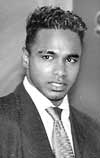| Who runs
the game?
By Vimal Perera
The SLRFU being the governing body
for rugby in Sri Lanka has responsibilities arising
from its various relationships. The job of the Union
is that of being the facilitator and or administrator
for the continuance and development of the game in Sri
Lanka. Therefore they have a link with the world governing
body as well as the Government of Sri Lanka through
the Ministry of Sports. This flows down by virtue of
their status with the provincial bodies, the clubs and
the schools section as well as the public.
 |
| Sanjeewa Jayasinghe having a turbulant
time with the rugby authorities |
The provincial unions are the creation
of the Union as per its constitution. The council consists
of nominees from the provinces and representatives of
other affiliated bodies. Provincial Unions consist of
recognized rugby clubs within that province.
The Union is at the centre of a complex
web of relationships that has to interact for the promotion
and management of the game.
There is a large number of parties
who from time to time take interest and whose actions
have an effect on the game and therefore on the Union.
Currently there is controversy arising
from acts in the schools section as well as with a player
taking the Union to courts. Where the schools section
is concerned there have been acts of indiscipline reported
and allegations of players who are not eligible to play
taking part. While one of the accusations has been settled
there are others which are pending inquiry as I understand
from reliable sources. This being an area that can bring
disrepute to the game there is a need for the Union
to take notice and see that justice is done. It is important
because parent’s expectation when their children
are competing; is one of fair chance and correct spirit.
The union in charge of promoting the sport has a responsibility
to correct wrong acts and or dispels the thoughts of
impurity that may arise as a result of adverse publicity
if the statements are wrong.
Similarly the Union has a responsibility
to look after and take disciplinary action where ever
it is necessary to safeguard the game and the actors
involved. The disciplinary action taken by the Union
against a player is one of them. The right of the player
to seek redress from the judiciary of the country is
a right that cannot be denied to the player. Nevertheless
the events that have led to the Union’s action
has to be understood while we wait the final determination
of the judiciary on the pending issue. The player is
under a suspended sentence and there is another accusation
against him. Thus the need for the Union to inquire
came up. This is well within the scope of responsibilities
of those who mange the affairs of the council. The decision
to enforce punishment for actions of further indiscipline
while the player is serving a sentence is the crux of
the matter. Technicalities aside the judiciary having
heard both parties will decide whether the action is
justified.
The lesson to be learnt is that what
has to be done need to be done. But it must follow a
professional process that ensures justice. In this sense
the responsibilities of the council members, who work
in an honorary capacity, must be to focus on the key
purpose. That is to ensure the games prosperity by collectively
directing the affairs of rugby while meeting the appropriate
interest of its stake holders. This requires more and
more delegation of the operational aspects and there
to be professional support to handle such affairs. There
is always another voice to hear as the money spent is
in no way small.
Because the actions have been legally
challenged the council cannot take a position of protecting
themselves by not taking action on issues that may lead
to confrontation. Challenge must be viewed as healthy
pursuant towards excellence. This can only be achieved
if there is strength to council members of having being
professionally advised. The paradigm shift is to be
one of being involved in policy and direction as against
operational aspects. Operational aspects should be left
to a team of administrators who run operations and are
not part of the policy makers. To that extent they are
independent in working and responsible for carrying
out the directions of the council as well as to present
matters for council to review freely.The need is to
move into positions of strength and not to weakness.
Just as much a player has challenged the action of the
council there can be reverse action. Somebody can challenge
you for not taking action. This has happened in many
parts of the world where persons who suffer injury and
or hard ship because of inaction taking the administrators
to the judiciary. One can always confront the council
if they fail to take notice of acts that foster indiscipline.
What if somebody were to ask why the suspended sentence
is not enforced when there is breach of good discipline
while serving the sentence. Has somebody opened a whole
new can of worms?
The need of the hour and the future
is for leaders to have vision and courage to face the
threats by improving its weak points and making use
of the opportunity to move to a better position of strength.
|
